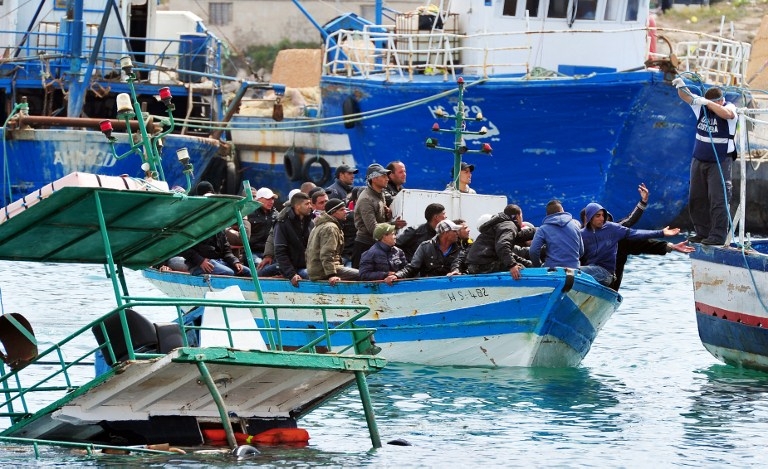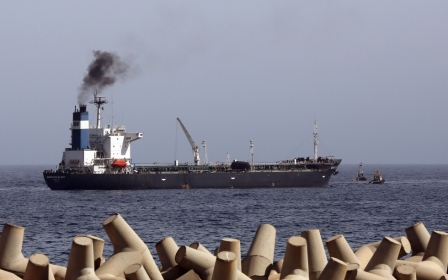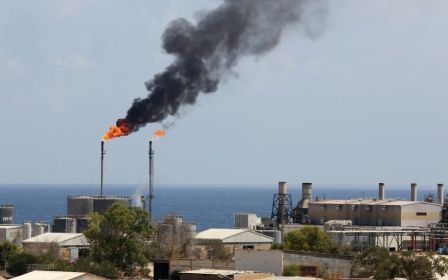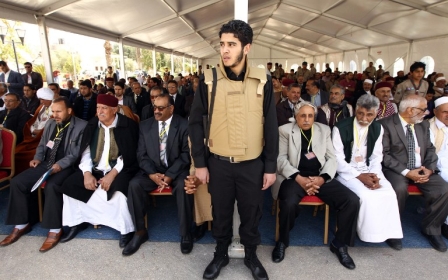UN urged to help Libya over immigrant influx to Europe

Italy called Friday for the UN's refugee agency to help the newly elected Libyan government deal with the huge flow of immigrants and asylum seekers setting off from its coasts for Europe.
"We have a record number of women, men and children arriving, 96 percent of the time from Libya," Prime Minister Matteo Renzi said in a press conference in Rome, just hours after another 800 boat migrants were rescued and taken to safety in southern Italy.
The number of arrivals this year has now topped the record 63,000 set in 2011 during the Arab Spring uprisings and Italy has been hit by several boat tragedies, with at least 125 people dying during crossings this week alone.
"Our aim is to help the Libyan authorities allow the UNHCR to manage the flow of men and women [in Libya], and identify which of them are asylum seekers," Renzi said after talks with European Commission head Jose Manuel Barroso.
"The Mediterranean is not Italy's sea but the border to Europe, or rather the heart of Europe," he said, calling for more investment in the EU border agency Frontex and greater collaboration from other countries in the bloc.
"It is not possible in 2014 to allow a boat full of children to sink," he said.
Barroso applauded Italy for its ‘Mare Nostrum’ [‘Our Sea’] navy rescue operation, adding that the European Commission "has been asking for a long time for a more cooperative approach. The problems are not just for Italy, Greece, Malta or Spain."
"We need a better pooling of the resources of our member states, which could help not just in terms of the Mediterranean, but also in terms of refugees in need of European hospitality," he said.
Two killed in Benghazi crossfire
Meanwhile east of the country, two Libyan civilians were killed during fighting early Thursday between forces loyal to renegade general Khalifa Haftar and militiamen in the eastern city of Benghazi, a medical source said.
Bodies of the two civilians, who had been burned to death when a mortar shell hit their vehicle, were admitted to the Benghazi hospital early Thursday, the source said.
Another civilian was seriously injured in the attack, according to the source.
"Paramedics said mortar shells were flying everywhere after Haftar's forces targeted a camp belonging to the February 17 militia," the source said.
Benghazi has been the scene of mounting crime and militancy since the 2011 ouster of strongman Muammar Gaddafi.
The eastern city has also witnessed fighting between Haftar's forces and Islamists, which have become a common feature of post-Gaddafi Libya.
More Libyan oil output
Meanwhile, oil extended losses on Thursday on prospects that Libya will begin exporting more crude.
US benchmark West Texas Intermediate for August fell 42 cents to finish at $104.06 a barrel, its sixth consecutive session of losses.
Brent North Sea crude for delivery in August dropped 24 cents to $111.00 a barrel in London trade.
Prices dropped after Libya's interim Prime Minister Abdullah al-Thani on Wednesday declared that authorities had regained control of export terminals blockaded by rebels.
Crude was down "due to the relatively quiet situation in Iraq and the Libyan port deal, both of which kept supplies up," said analyst Sanjeev Gupta at consultancy EY.
Libyan production has been severely limited for a year after rebels last summer blockaded terminals as part of a campaign to restore autonomy in the country's eastern region.
Its output currently stands at some 320,000 barrels per day, about a fifth of its normal output.
Rebel leader Ibrahim Jodhran said lifting of the blockade on the Ras Lanuf and Al-Sidra terminals was in line with an April deal with Tripoli, and a sign of goodwill toward the new parliament elected last week.
The reopening of the two terminals will "add 500,000 barrels of crude per day into the global energy market," EY analyst Gupta said.
New MEE newsletter: Jerusalem Dispatch
Sign up to get the latest insights and analysis on Israel-Palestine, alongside Turkey Unpacked and other MEE newsletters
Middle East Eye delivers independent and unrivalled coverage and analysis of the Middle East, North Africa and beyond. To learn more about republishing this content and the associated fees, please fill out this form. More about MEE can be found here.




